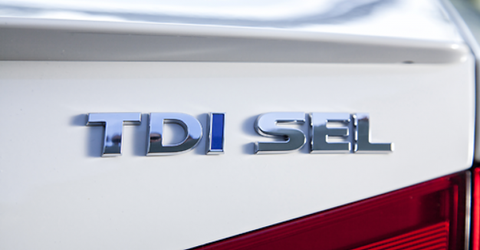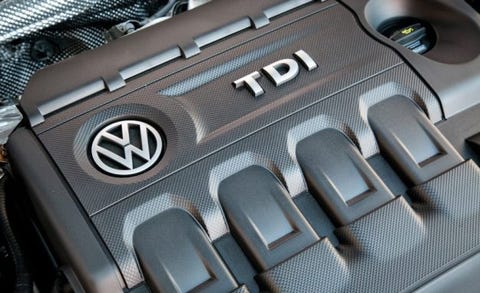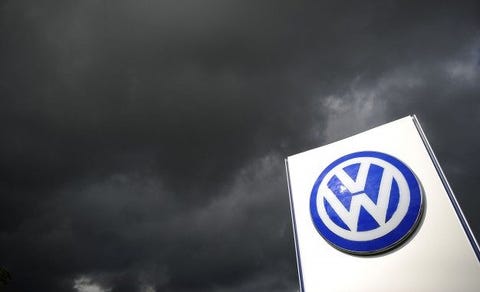2011 Vw Phaeton W12

Approximately 200,000 late-model TDI-badged Volkswagen four-cylinder diesel vehicles, many of which were until recently used as daily drivers, now sit unused in massive holding lots. Some of those lots stand as awkward public reminders of just how much work Volkswagen has ahead of it to remedy owners, fix vehicles, and mend its reputation. And you know the parking's not free.
The vehicles have been bought back with generous cash payments—an average of about $21,600 and up to a maximum of more than $45,000. And now, because of slow progress regarding potential fixes that would bring vehicles back into emissions compliance—or close enough to it to satisfy regulators—it's looking as if VW might just keep these cars parked right where they are for another year or more.
"These vehicles are being stored on an interim basis and routinely maintained in a manner to ensure their long-term operability and quality," spokesperson Jeannine Ginivan toldC/D.
Under the elaborate consent decree that governs the terms of its diesel emissions settlement with the U.S. Environmental Protection Agency and the California Air Resources Board (CARB), Volkswagen has to pull the engine-control unit (ECU) from vehicles that it buys back. After that, it has a choice: It can salvage the vehicles for parts and sell those in the U.S. or abroad (except for the ECU, oxidation catalyst, or particulate filter), or it can opt to fix the vehicles.
To appease regulators, VW has to perform an "approved emissions modification" on at least 85 percent of the affected vehicles by June 30, 2019, or the company could be subject to additional fines. Vehicles that are bought back otherwise need to be scrapped or "removed from commerce" if they're not fixed, and no vehicles can be exported, either, until the approved emissions modifications have been done.
Waiting for Tricky Fixes
It's those fixes themselves that get tricky. There are three generations of the 2.0-liter four-cylinder diesel affected by this scandal and settlement. As of yet, a fix has only been approved for the most recent. Known as Generation 3 versions, these include the 2015 Golf, Golf SportWagen, Jetta, Passat, and Beetle as well as the Audi A3.

On January 6, Volkswagen received approval from EPA and CARB to perform a two-phase fix on these vehicles; the 54,000 owners and lessees of Generation 3 vehicles that hadn't completed the buyback at that time were sent notices on the first step, which included removing the defeat device. Making this modification entitles the owner to two-thirds of the restitution payment, which depends on the vehicle and is typically several thousand dollars, while the owner can continue to drive the vehicle and get the remaining one third when they make a yet to be detailed or approved hardware fix that will involve "new emissions-control mechanisms."
Late last month the EPA said that it will allow VW to sell Generation 3 vehicles after the first step, although, with both steps, the priority is to fix vehicles that are still being driven. "We currently expect the required hardware for phase 2 of this modification to be available beginning in early 2018, and we will notify eligible customers as soon as this happens," Volkswagen of America said in a recent statement.
Approval for Generation 2 remedies, which includes the 2012–2014 Passat TDI, could be a little further off. And Generation 1 vehicles, which were fitted with a lean-NOx trap and no selective catalytic reduction (SCR), or urea injection, system whatsoever, will require more complicated solutions to be brought close to compliance, if they even can.
Buyback in the Fast Lane
Nevertheless, VW is buying vehicles back at a rapid pace. It officially launched the Claims program in late 2016, and from November 20, 2016, through February 18, 2017, VW had extended 323,179 offer letters for the settlement, which allowed owners to opt for possibilities that included buybacks, early lease termination, approved emissions modifications, and restitution payments. As of that same date, VW had closed nearly 138,000 buyback deals (including about 5800 early lease terminations), adding up to just over 28 percent of eligible vehicles, and had scheduled approximately 221,000 closing appointments. It then expected to keep its pace of buying back about 15,000 vehicles per week—so it's likely that the total number bought back tops 200,000 by a significant amount.

"Vehicles that are not modified because of their age or condition or for other reasons will be responsibly recycled, in accordance with the terms of Volkswagen's settlements with U.S. environmental authorities and other parties," Ginivan said. Volkswagen hasn't offered any additional details yet about how these vehicles are to be recycled, although it noted that the company did do a pilot scrap program last summer.
In the meantime, the once loved TDIs will continue to keep accumulating, to the benefit of those who rent the parking to VW. At some point, it may become more beneficial for Volkswagen to merely scrap the cars, recover money from the parts and materials, and free up the overhead. That point, however, is likely at least many months away.
This content is created and maintained by a third party, and imported onto this page to help users provide their email addresses. You may be able to find more information about this and similar content at piano.io
Source: https://www.caranddriver.com/news/a15341709/what-is-vw-going-to-do-with-all-those-bought-back-tdis/

Komentar :
Posting Komentar